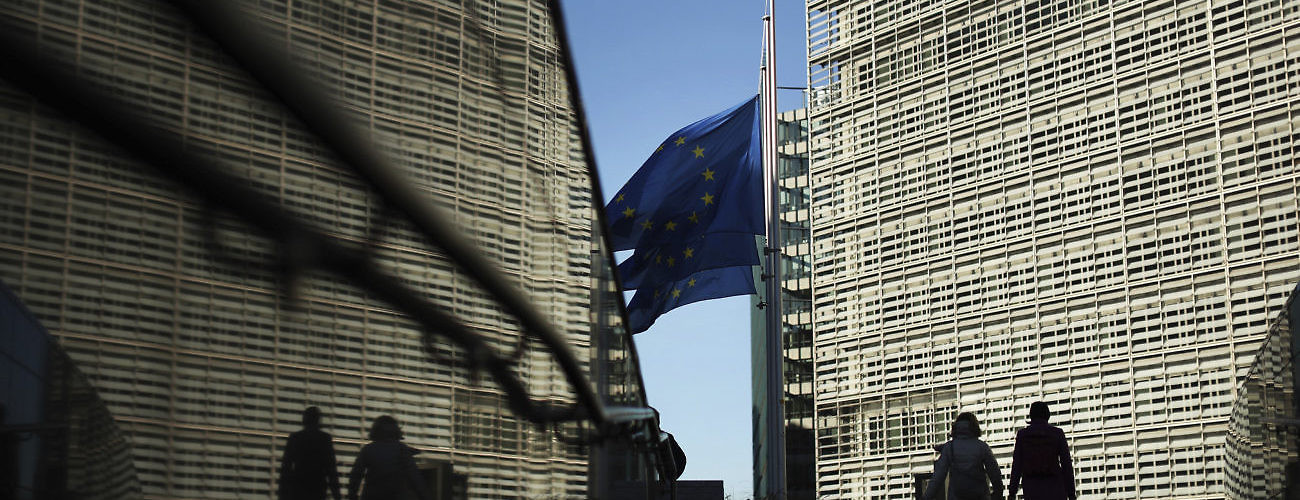Passers-by walk next to the European Commission headquarters in Brussels, on February 15, 2019. (AP Photo/Francisco Seco)
Migration looks to be the biggest topic for voters in the upcoming European Parliament elections in May. The most recent Eurobarometer survey shows that forty percent of Europeans consider immigration to be one of the two most important issues facing the European Union (EU). Immigration was the highest reported of all issues, far ahead of terrorism (twenty percent) or the economy (eighteen percent).
While some subjects, like the Dublin Regulation, are so politicized and difficult that reform can appear implausible at this point, there are still numerous, discrete migration-related issues where the EU parliament has been able to act.
In 2018, the parliament passed three resolutions for which non-governmental organizations (NGOs) and civil society actors in the migration field have been campaigning.
The first was a call to end the detention of migrant children. Practices vary across the EU when it comes to migrant child detention. Although even a short time in detention can have a devastating impact on health and well-being of children, only a handful of member states never detain migrant children.
A second resolution called on member states to prevent the criminalization of humanitarian assistance. This was passed in response to a series of alarming arrests and legal proceedings against humanitarian aid workers and volunteers who had helped rescue asylum seekers and migrants in danger of drowning in the Mediterranean Sea. Some of these legal proceedings are still ongoing.
The third resolution requested the European Commission to submit proposed regulations for a European Humanitarian Visa, which would provide a safe, legal pathway to a particular member state for people seeking protection. This is already an option in some countries, like Italy, where the humanitarian corridors program enjoys a broad base of support from the public and community and religious groups, but this program and others like it are small and not available EU-wide.
While these resolutions did not create widespread changes in the EU’s migration policy, they were steps that could help save or improve the lives of many—children trapped in prison-like conditions, humanitarian workers and volunteers (and the people they rescue), and people around the world who need a safe way to escape from violent conflict or other desperate situations.
Small But Big
Thus, the upcoming elections are important not just for how they might impact high-level migration policy, but also because they have major consequences for how the parliament will approach these “small” yet important migration topics in the future. This especially because these types of actions are likely to focus on the most urgent humanitarian and human rights issues in migration.
Looking at how parliament ministers voted on these resolutions, all passed either by a show of hands demonstrating a clear majority, or in the case of humanitarian visas, by a large majority of 429–194. It thus appears unlikely that a surge by far-right parties could change the parliament’s course on migration on its own.
The far-right and/or Euroskeptic Europe of Freedom and Direct Democracy (EFDD), Europe of Nations and Freedom (ENF), and European Conservatives and Reformists (ECR) groups currently hold 151 out of 751 seats in the parliament. Even large gains by these groups are unlikely to give them a majority.
Moreover, in the case of the EFDD, there has been considerable disagreement within the group. The Italian members of the EFDD, who come from the Five Star Movement, deviated from the rest of the group on all three resolutions by generally voting in favor of them.
However, support for far-right positions from the center-right European People’s Party (EPP), currently the largest group in the parliament, could still tilt the balance—even more so if the success of far-right parties makes more EPP members feel obliged to adopt similar positions or avoid controversy by abstaining from voting whenever migration comes up.
Internal Splits
Divisions among EPP members also tend to take the form of national voting blocs. There were 52 EPP members who voted against humanitarian visas, including all 12 parliament ministers from Hungary and 15 of 20 ministers from France (121 voted in favor and 24 abstained).
These results underscore the importance of national voting blocs within the political groups, as the national parties comprising each EU political group can have significantly different agendas.
These voting patterns suggest that NGOs and civil society can have a major impact on outcomes by campaigning at the national level.
These types of efforts can help ensure that, even if far-right groups and positions gain ground following the upcoming elections, the EU parliament can continue its work to support human rights, humanitarian action, and a more humane system of migration.
Monica Li is the content editor for the Migration Policy Group, based in Brussels. She also contributes to the Migration News Sheet. A version of this article was originally published on the Migration News Sheet.





